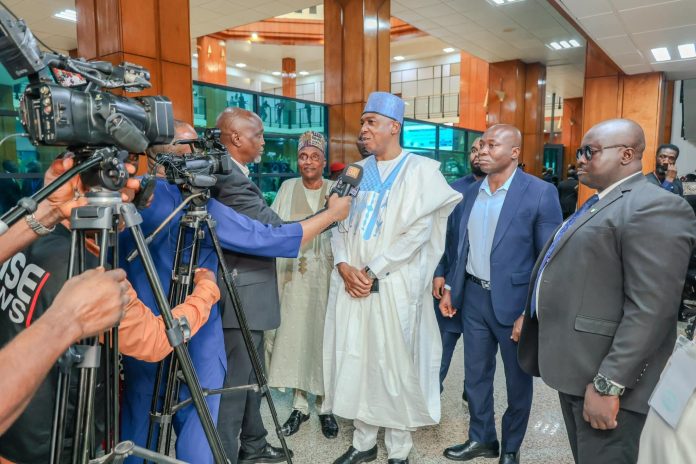Former Senate President, Dr. Abubakar Bukola Saraki, has revealed that his official portrait was excluded from the Senate Gallery honoring former presiding officers for four years and was only recently added — a move he credited to current Senate President Godswill Akpabio.
Saraki made the disclosure in a statement titled: “The National Assembly and Nigeria’s Democracy in the Last 26 Years”, which he said he had prepared for delivery at the joint session of the National Assembly on Democracy Day, June 12, but could not deliver due to time constraints.
“Just as my portrait was missing for four years in the Senate Gallery created for all former presiding officers, it was brought in just recently,” Saraki said. “I thank my good friend, Senator Godswill Akpabio for that.”
Saraki, who served as Senate President from 2015 to 2019, used the occasion to reflect on the progress and challenges facing Nigeria’s democratic journey, especially the role of the legislature in sustaining the country’s 26 years of uninterrupted democratic rule.
He congratulated Nigerians for their resilience in defending democracy and paid tribute to the heroes of the pro-democracy movement, including those who lost their lives during the struggle to end military rule.
Saraki commended President Bola Tinubu for choosing to commemorate Democracy Day within the chambers of the National Assembly rather than at the Presidential Villa or other symbolic venues, saying the legislature remains the true embodiment of democratic values.
“Today’s gathering indicates clearly that the legislature is the bedrock of democracy,” he noted.
Citing historical examples, Saraki highlighted the National Assembly’s role in key democratic moments — from resisting tenure elongation during the “third term” saga to resolving constitutional crises through the Doctrine of Necessity, and standing firm in defending legislative independence during his own tenure.
However, he expressed concern that the legislature is gradually becoming a “shadow” of the vibrant institution it once was.
“We owe it a duty to those who fought for the present democracy and the generations to come to strengthen this institution,” he said.
He accused both the executive and judicial arms of government of consistently undermining the legislature through interference in its leadership, misinterpretation of its oversight functions, and attacks on its independence.
Saraki called for a renewed commitment to the values of multi-party democracy and dissent, urging that both majority and minority views must be respected.
“The voting system in parliament is ‘Aye’ and ‘Nay’. It is not designed to be one-sided. Democracy thrives when minority voices are heard, even if the majority ultimately carries the vote,” he stated.
He also emphasized the need to improve youth and women participation in politics, especially within the National Assembly, pointing to the Not Too Young To Run law as a starting point for broader inclusion.
In a pointed remark near the close of his message, Saraki thanked the 10th National Assembly for inviting him to speak despite his opposition party affiliation — a gesture he implied might not have been possible under a more partisan leadership in the past.
“If it were in another time, they would have been looking at the body language of the President and my invite would have gotten missing. Just like my portrait,” he said wryly.
Saraki concluded his remarks with a call to action: for a stronger, more inclusive parliament that continues to serve as a voice for the people and a check on executive power.
“Happy Democracy Day to all Nigerians. God bless our dear country. God bless us all.”
Vanguard
